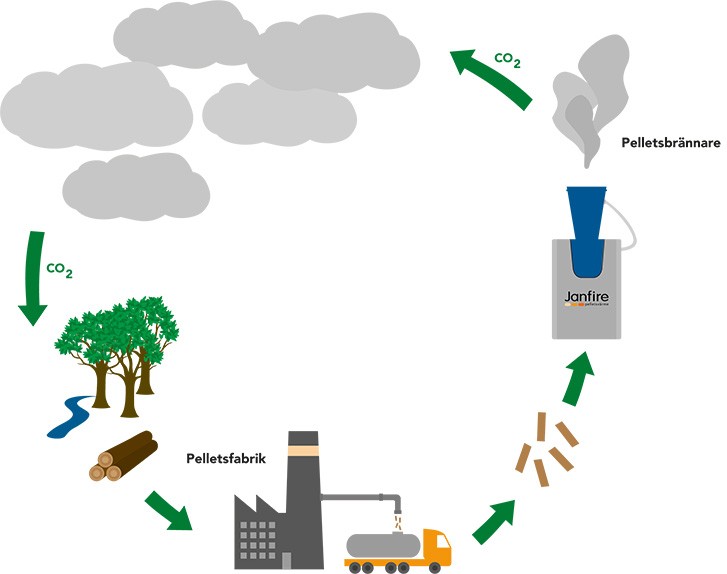Pellets provide energy from the Swedish forest
Pellets are a natural climate-neutral product that is part of nature’s cycle. Unlike fossil fuels, such as oil and gas, pellets do not contribute to the greenhouse effect and thus do not pollute the atmosphere and the environment.
Where do pellets come from?
When producing pellets, wood chips are ground from, for example, the sawmills into a powder that is pressed together and dried. The compression of the chips means that the pellets have a higher energy content than, for example, firewood.
The pellets used in Janfire’s pellet burners consist of compressed wood waste from Swedish forests, usually produced in Sweden. As a rule, the raw material is sourced from the local area, which minimizes transport.
Burning with pellets
Burning with a pellet boiler basically works like burning with other fuels. What is required is a pellet boiler, a pellet burner and a pellet storage room.
The pellets are carried from the storage/container to the burner using a feed screw. When incinerated, hot flue gases are formed in the boiler that heats water in an accumulator tank. The heated water is then pumped into the heating system.
Benefits of pellets
Using pellets has many advantages.
Pellets are a dry fuel with consistent quality that provides excellent conditions to be fired in a stable and efficient way. The efficiency of combustion of pellets exceeds wood burning by a wide margin.
As a rule, a pellet plant has lower operating costs compared to most other systems. It also requires less maintenance.
Pellet burning also has clear advantages in terms of sustainability and the environment.
Pellets part of the green cycle
Pellets are a renewable energy source directly sourced from the Swedish forest. A natural part of what is sometimes called the green cycle.
The green cycle shows the interaction between forests, forest products and the atmosphere. In photosynthesis, trees use the air’s carbon dioxide to build wood fiber. The raw material from the forest is then used for e.g., wood products, pulp, and biofuels such as pellets. The pellets are used for energy production and turn into carbon dioxide that can be re-absorbed by growing trees.
The pellets are thus climate neutral and do not generate more carbon dioxide than the tree absorbs during its lifetime.


